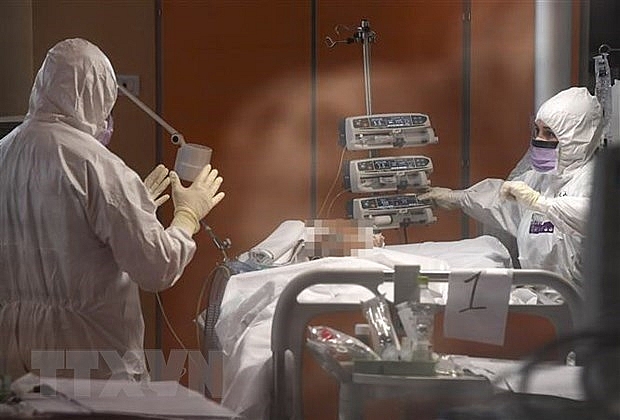First World Bank operations for COVID-19 emergency health support underway
 |
| Health workers treating a COVID-19 patient in Rome, Italy. Photo: Xinhua/VNA |
The World Bank's Board of Executive Directors today approved the first set of emergency support operations for developing countries around the world, using a dedicated, fast-track facility for COVID-19 (coronavirus) response. In addition, the World Bank is working worldwide to redeploy resources in existing World Bank-financed projects worth up to $1.7 billion, including through restructuring, use of emergency components of existing projects (CERCs), and triggering of CAT DDOs spanning every region.
The World Bank Group is prepared to deploy up to $160 billion over the next 15 months to support COVID-19 measures that will help countries respond to the immediate health consequences of the pandemic and bolster economic recovery. The broader economic programme will aim to shorten the time to recovery, create conditions for growth, support small- and medium-sized enterprises, and help protect the poor and vulnerable. There will be a strong poverty focus in these operations, with an emphasis on policy-based financing and protecting the poorest households and the environment.
“The World Bank Group is taking broad, fast action to reduce the spread of COVID-19 and we already have health response operations moving forward in over 65 countries,” said World Bank Group president David Malpass.
“We are working to strengthen developing nations’ ability to respond to the COVID-19 pandemic and shorten the time to economic and social recovery. The poorest and most vulnerable countries will likely be hit the hardest, and our teams around the world remain focused on country-level and regional solutions to address the ongoing crisis.”
Responding to widespread supply chain disruptions, the World Bank is also helping countries access critically needed medical supplies by reaching out to suppliers on behalf of governments. It is also encouraging others to provide financial support to developing countries for COVID-19 health response.
“This fast response package will save lives and help detect, prevent, and respond to COVID-19 in the countries we serve,” said Axel van Trotsenburg, World Bank managing director of operations. “Our country operations will be co-ordinated at a global level to ensure best practice is quickly shared, including approaches to strengthen national health systems and prepare for potential follow-on waves of this devastating virus.”
Among the initial projects approved, in East Asia and the Pacific, $26.9 million will help Mongolia to train emergency care doctors, nurses, and paramedics; purchase medical and laboratory equipment and supplies; rehabilitate healthcare facilities; and strengthen the country’s capacity to respond to health crises. And $20 million will help Cambodia establish laboratories and isolation and treatment centers in 25 provincial referral hospitals and equip them with essential medical and testing supplies.
The International Finance Corporation (IFC) is providing $8 billion in financing to help private companies affected by the pandemic and preserve jobs. The IFC is already working to rapidly deploy a pipeline of approximately 300 companies across emerging markets to shore up private sector activity.
IFC engagements include extending trade finance and working capital lines to partner financial institutions, as well as supporting existing clients in the infrastructure, manufacturing, agriculture, and services industries that are vulnerable to the pandemic. To dater, the IFC has committed 470 transactions in the amount of $545 million in trade finance lines through its Global Trade Finance Program, 54 per cent of which was in low-income and fragile countries and 29 per cent in Sub-Saharan Africa and MENA.
The broader financial support includes $6 billion in guarantees from the Multilateral Investment Guarantee Agency (MIGA), which provides political risk insurance and credit enhancement to private sector investors and lenders.
What the stars mean:
★ Poor ★ ★ Promising ★★★ Good ★★★★ Very good ★★★★★ Exceptional
 Tag:
Tag:
Themes: COVID-19
- 67 million children missed out on vaccines because of Covid: UNICEF
- Vietnam records 305 COVID-19 cases on October 30
- 671 new COVID-19 cases recorded on October 1
- Vietnam logs additional 2,287 COVID-19 cases on Sept. 21
- People’s support decisive to vaccination coverage expansion: official
Related Contents
Latest News
More News
- NAB Innovation Centre underscores Vietnam’s appeal for tech investment (January 30, 2026 | 11:16)
- Vietnam moves towards market-based fuel management with E10 rollout (January 30, 2026 | 11:10)
- Vietnam startup funding enters a period of capital reset (January 30, 2026 | 11:06)
- Vietnam strengthens public debt management with World Bank and IMF (January 30, 2026 | 11:00)
- PM inspects APEC 2027 project progress in An Giang province (January 29, 2026 | 09:00)
- Vietnam among the world’s top 15 trading nations (January 28, 2026 | 17:12)
- Vietnam accelerates preparations for arbitration centre linked to new financial hub (January 28, 2026 | 17:09)
- Vietnam's IPO market on recovery trajectory (January 28, 2026 | 17:04)
- Digital economy takes centre stage in Vietnam’s new growth model (January 28, 2026 | 11:43)
- EU Council president to visit Vietnam amid partnership upgrade (January 28, 2026 | 11:00)




























 Mobile Version
Mobile Version